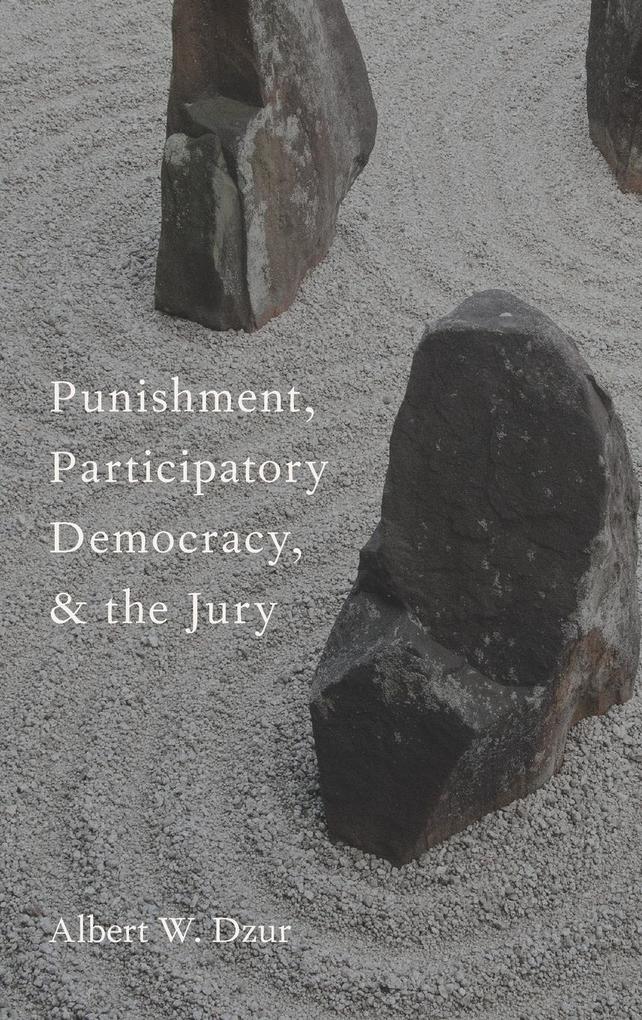
Zustellung: Fr, 11.07. - Mi, 16.07.
Versand in 2 Wochen
VersandkostenfreiBestellen & in Filiale abholen:
Focusing democratic theory on the pressing issue of punishment, Punishment, Participatory Democracy, and the Jury argues for participatory institutional designs as antidotes to the American penal state. Citizen action in institutions like the jury and restorative justice programs can foster the attunement, reflectiveness, and full-bodied communication needed as foundations for widespread civic responsibility for criminal justice.
Inhaltsverzeichnis
- Acknowledgments
- 1. Three Puzzles about Crime, Punishment, and the Death of the American Jury
- 2. The Myth of Penal Populism
- 3. Participatory Democracy and Rational Disorganization
- 4. The Jury as a Civic Schoolhouse
- 5. Democracy in the Court: Lay Contributions to Justice
- 6. Juries, Juries, Everywhere (But Not Inside the Courts)
- 7. Reviving the Jury: Active Juries, Juror Activism, and Institutional Change
- 8. Public Justice vs. the Penal State^
- Bibliography
- Index
Produktdetails
Erscheinungsdatum
01. September 2012
Sprache
englisch
Seitenanzahl
240
Autor/Autorin
Albert W Dzur
Verlag/Hersteller
Produktart
gebunden
Gewicht
454 g
Größe (L/B/H)
239/160/23 mm
ISBN
9780199874095
Pressestimmen
"An elegantly written, wide-ranging, and finely textured account of juries as democratic institutions. Dzur argues that juries provide the most prominent, time-tested cases in which institutions are both limited and guided by the deliberative wisdom of lay citizens. In making the case, Dzur reverses the common notion that the key problem for democracies is to produce virtuous citizens. Rather, the task is to design institutions that transmit citizen virtues into collective governance. By moving the jury to the center of debates about participatory governance, Dzur is able to show how much we already know about designing deliberative and participatory institutions."
--Mark E. Warren, Harold and Dorrie Merilees Chair in the Study of Democracy, University of British Columbia
"Albert Dzur has written a lively, accessible, and very incisive book. He argues persuasively for the importance of democratic participation in the American criminal justice system as an antidote to overcriminalization and mass incarceration. He demonstrates deep sensitivity to character of the American jury trial and the distinctiveness of American public culture. This is political theory at its most lucid and helpful!"
--Robert P. Burns, Professor of Law, Northwestern University, and author of The Death of the American Trial and A Theory of the Trial
"Like many others, Albert Dzur deplores the 'penal populism' of recent years in the United States. Unlike others, however, he vigorously defends the jury as a form of 'democratic justice' that is superior to the 'technical' or 'expert' justice others are advocating. This defense, moreover, is only one facet of an intriguing and insightful exploration of the ways in which restorative justice and participatory democracy converge in 'a juridical form that allows citizens to own up to their laws.' Political theorists, criminologists, lawyers-anyone who cares about law and democracy-should read this book."
--Richar
--Mark E. Warren, Harold and Dorrie Merilees Chair in the Study of Democracy, University of British Columbia
"Albert Dzur has written a lively, accessible, and very incisive book. He argues persuasively for the importance of democratic participation in the American criminal justice system as an antidote to overcriminalization and mass incarceration. He demonstrates deep sensitivity to character of the American jury trial and the distinctiveness of American public culture. This is political theory at its most lucid and helpful!"
--Robert P. Burns, Professor of Law, Northwestern University, and author of The Death of the American Trial and A Theory of the Trial
"Like many others, Albert Dzur deplores the 'penal populism' of recent years in the United States. Unlike others, however, he vigorously defends the jury as a form of 'democratic justice' that is superior to the 'technical' or 'expert' justice others are advocating. This defense, moreover, is only one facet of an intriguing and insightful exploration of the ways in which restorative justice and participatory democracy converge in 'a juridical form that allows citizens to own up to their laws.' Political theorists, criminologists, lawyers-anyone who cares about law and democracy-should read this book."
--Richar
Bewertungen
0 Bewertungen
Es wurden noch keine Bewertungen abgegeben. Schreiben Sie die erste Bewertung zu "Punishment, Participatory Democracy, and the Jury" und helfen Sie damit anderen bei der Kaufentscheidung.









